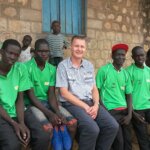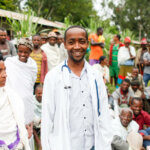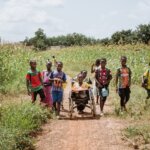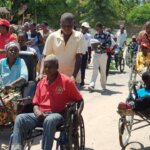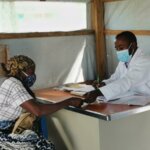- Disability Rights
- Humanitarian Action
An interview with Klaas Aikes, Light for the World Programme Coordinator about the situation of refugees with disabilities in South Sudan.
The young country of South Sudan is experiencing one of the worst humanitarian crises worldwide at the moment. Since the end of 2013, 2.25 million people have fled to securer regions of the country. Among them: blind persons, deaf persons, persons with different kinds of disabilities. Refugees with disabilities are often lost and overlooked. Klaas Aikes, LIGHT FOR THE WORLD Programme Coordinator notices such people and knows how closely linked conflict and disability truly are.
Why are refugees with disabilities particulary vulnerable?
Klaas Aikes: Before people get into camps, they have to run from their homes because of a disaster or sudden fighting. They are often lost or left alone, because many cannot move fast. So they are more or less forgotten. In refugee camps, persons with disabilities have special needs when it comes to physical accessibility and information provisions. Someone who uses crutches or a wheel chair will have problems accessing health facilities with stairs for example. Someone who has a physical disability may have troubles standing in line when food or other items are being distributed. They are left alone if the situation is chaotic and people are fighting to get closer to the distribution line. A blind person cannot get any help if he/she doesn’t get any help to orientate his or herself in the refugee camp. They will have trouble using bathrooms without special accessibility measures. People with physical disabilities face the same situation. Deaf persons (who often cannot read or write either) miss out on any information on aid distribution or sessions with medical facilities. Children with disabilities often cannot participate in temporary schools in camps. Persons with disabilities are rarely chosen to represent the population in councils in order to help the camp management. Thus their point of view is seldom taken into account. The camp management is often willing but not very well aware of how to support persons with disabilities.
How does LIGHT FOR THE WORLD support refugees with disabilities in the Mahad & Gumbo camps?
Klaas Aikes: We are working with the camp management to make them think inclusively in terms of the provision of services. We provide funding to ensure that facilities become accessible, such as bathrooms. We work together with health care providers to make services accessible. We help people with disabilities to have a voice when it comes to making decisions and we raise awareness among the camp population. We arrange medical treatment for children who need operations and we provide assistive devices. Also, a youth club has formed a sports team that works for peace building within the camp and for awareness raising on disabilities. They help persons with disabilities to move, go to events, get food etc.
What is one experience that you had during your recent stay in the camps that you will never forget?
Klaas Aikes: A child had an injured leg and I saw photographs of how the child suffered. It was a complicated fracture. LIGHT FOR THE WORLD arranged for the child to have an operation and showed the mother exercises for her child, so that the child could fully recover and run about again like children do. I also met up with the football team comprised of youth from different tribes in the camp. Social interaction between different tribes occurs rather seldom because such interaction generally results in conflict and tensions. However, in this particular situation, the youth were given peace education and they do sports together (football, volley ball). They help their parents to overcome suspicions and fear against other people and they have a wonderful influence on the camp.
